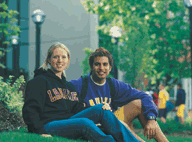Master of Arts in Social Justice and Community Engagement
Through an applied focus at the local scale, the Master of Arts (MA) program in Social Justice and Community Engagement (SJCE) is committed to engaged scholarship informed by critical social justice/environmental justice theories and approaches. Social and environmental justice is grounded in human rights and the dignity of every human being. It is based on the principles of solidarity, sustainability and equality. Social and environmental injustices are underpinned by a suite of common factors including class, poverty, racism, gender discrimination and lack of due process that marginalize people and communities. The MA in SJCE fosters students' abilities to investigate and understand these root causes and to engage in the active promotion of social and environmental justice principles and the resolution of community-level injustices.
In this 12-month, 3-term program, students will develop skills that facilitate community capacity development, local-level innovation, sustainability and democratic renewal. In the first two terms, students will take 4 half-credit courses, a professionalization seminar course, and complete a 120-hour community placement. In the third term, students will take 2 half-credit courses designed around the skills necessary for social justice careers. During the first term, students can choose to apply for the major research paper (MRP) option. This pathway will require the student to complete a major independent research project (worth 1.0 credit) in the third term of the program, in lieu of 2 half-credit courses.
Applicants are expected to have a four year honours BA from a humanities, social science, natural science or interdisciplinary program, and a background in the concepts of social and environmental justice. Applicants should have a minimum B standing or equivalent. An applicant who does not meet these requirements may still apply for admission as a qualifying student.
Applications are reviewed by the SJCE Admissions Committee, which considers all prior post-secondary grades, a resumé, a statement of intent that indicates the applicants' reasons for applying to the program and their areas of interest related to social and/or environmental justice, a writing sample,and letters of reference. Applicants are invited to indicate their preference for the MRP-based route, but admission to that pathway is not guaranteed.
The committee forwards their recommendations for admission to the Faculty of Graduate and Postdoctoral Studies, which determines the final offers of admission.
Proficiency in English usage, both written and oral, is essential to pursue graduate studies at Laurier. Applicants whose language of instruction during the undergraduate degree was not English, must furnish evidence of superior proficiency in English prior to admission.
Typical Program Progression:
Fall:
SOJE601 - Theories of Social Justice and Community Engagement (required)
SOJE603 - Community Capacity Development (required)
SOJE690 - Social Justice Research and Professionalization Forum (required)
SOJE631 - Special Topics in Social and Environmental Justice or a half-credit course selected from another WLU graduate program, or a Directed Reading Course; the latter two must be approved by the Graduate Co-ordinator.
Winter:
SOJE602 - Applied Research for Social Justice (required)
SOJE690 - Social Justice Research and Professionalization Forum (continued from fall)
SOJE621* - Social Justice Community Placement (required)
Spring:
SOJE621* - Social Justice Community Placement (continued from winter)
Course based option:
SOJE605 - Social Justice Practitioner's Toolkit,
SOJE606 - Changing the Political Terrain: Approaches to Organizing
or
MRP Option:
SOJE695* - Major Research Project
Note: Students wishing to complete the MRP must apply and be accepted into the MRP stream during the Fall Term.
Students are advised to consult the Graduate Co-ordinator as they progress in their program. All community placements andMRP topics must be approved by the Graduate Co-ordinator and must be considered within the scope of social and environmental justice issues.
Grades for all courses will be assigned in accordance with the course requirements specified in the WLU Graduate Calendar. All Masters' students must maintain a satisfactory academic standing as required by the general regulations of the Faculty of Graduate and Postdoctoral Studies.
Students in the MRP stream will undertake research that culminates in a final 50-60 page major research paper or an alternative creative work/engaged scholarship project. The alternative final project will be accompanied by a 20-30 page written report. All MRPs must be within the scope of social and environmental justice issues and sufficiently rigorous for a masters program. Each student will have an MRP committee consisting of an Advisor and a Second Reader. The MRP topic will be chosen in consultation with the advisory committee and the Graduate Co-ordinator. Student submission of the final MRP (including written work and any other appropriate documentation such as arts piece) will be followed by an oral defense to the MRP committee. The final grade will consider both the submitted work and the oral defense. The final grade will be determined jointly by the MRP committee.






